
PO2 - Past Ocean Oxygen Working Group
@pastoxygen.bsky.social
The working group’s scientific goal is to provide crucial insights into the natural variability of seawater dissolved oxygen concentrations during key time periods in the geological record.
Pinned
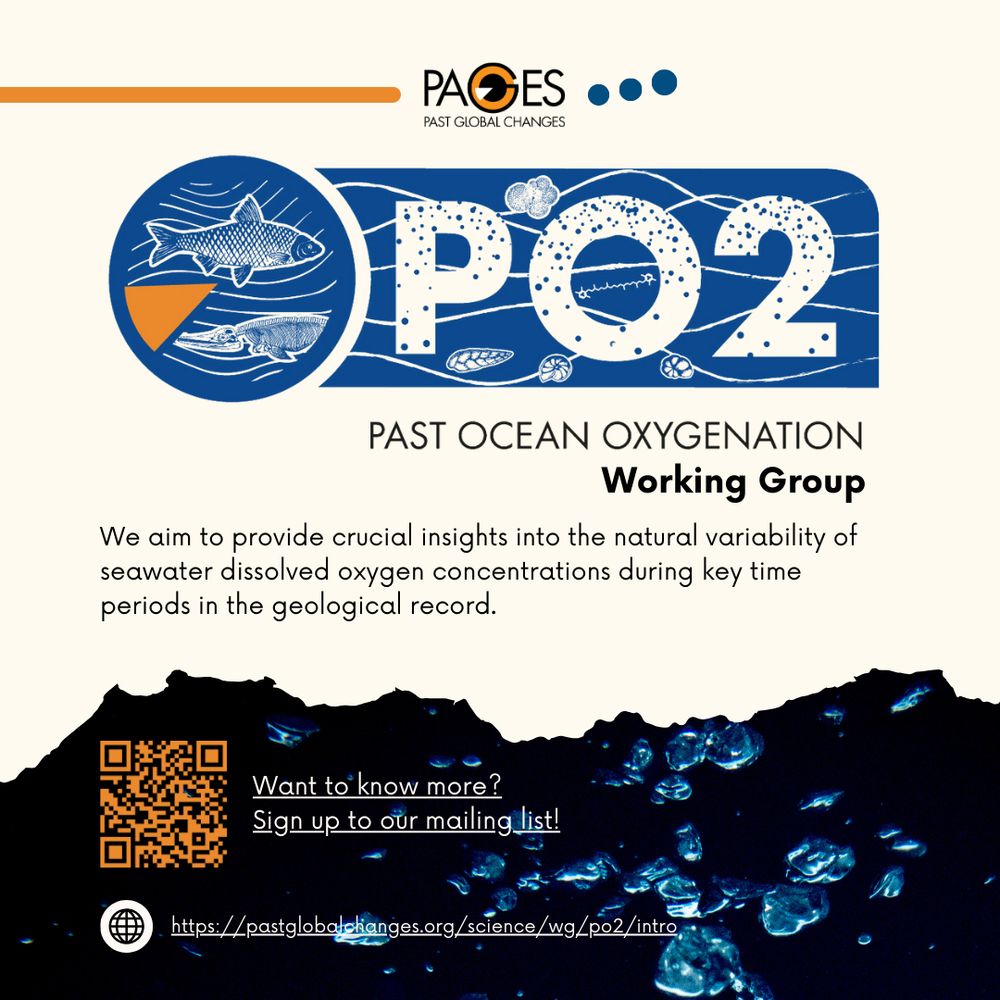
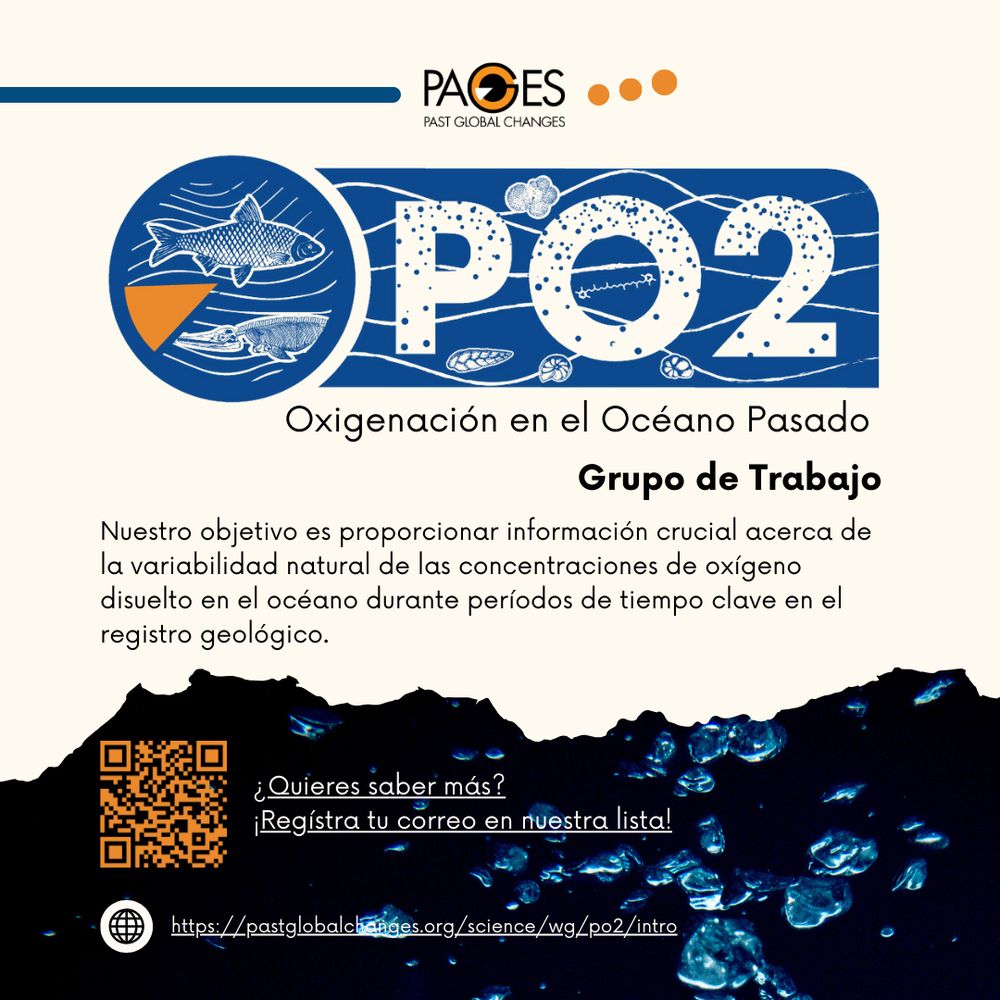
📢The Past Ocean Oxygenation @pages-ipo.bsky.social Working Group is here! 🚤 We provide insights into the natural variability of seawater oxygen in key periods of the geological record & communicate the science behind oxygen reconstructions 🐳 PO2 is here! pastglobalchanges.org/science/wg/p...
Today’s a special day. it’s World Science Day for Peace and Development! 🌍✨It’s all about boosting public awareness, sharing knowledge, and teaming up across borders. Because when nations unite through science, we get closer to figuring out how to live in a peaceful, sustainable world, together! 🔬🤝💚


November 10, 2025 at 9:47 PM
Today’s a special day. it’s World Science Day for Peace and Development! 🌍✨It’s all about boosting public awareness, sharing knowledge, and teaming up across borders. Because when nations unite through science, we get closer to figuring out how to live in a peaceful, sustainable world, together! 🔬🤝💚
Reposted by PO2 - Past Ocean Oxygen Working Group
Agglutinated forams (forams that make their shells by adding or agglutinating sorrounding stuff) make their shells by gluing things they find around them: sand, minerals, and skeletons of other organisms! This includes other forams, sponge spicules, even radiolaria! 😱😱
November 1, 2025 at 10:57 AM
Agglutinated forams (forams that make their shells by adding or agglutinating sorrounding stuff) make their shells by gluing things they find around them: sand, minerals, and skeletons of other organisms! This includes other forams, sponge spicules, even radiolaria! 😱😱
Reposted by PO2 - Past Ocean Oxygen Working Group
In the deep ocean, density differences drive thermohaline circulation as ocean layers have different temperature & salt content. In the shallower ocean, winds also drive circulation & supply oxygen! Today, areas with little oxygen (Oxygen Minimum Zones-OMZ) form where subsurface circulation is slow

November 4, 2025 at 2:19 PM
In the deep ocean, density differences drive thermohaline circulation as ocean layers have different temperature & salt content. In the shallower ocean, winds also drive circulation & supply oxygen! Today, areas with little oxygen (Oxygen Minimum Zones-OMZ) form where subsurface circulation is slow
Very proud to see our own @sofigerina.bsky.social shine! 🤩🌟💙
🏆 Congratulations to Dr. Sofía Barragán-Montilla, recipient of the 2026 PAGES Early-Career Award (ECA)
Sofía uses tiny fossils, foraminifera, to uncover big stories about our oceans’ past. 🌊Thank you for your inspiring contributions to #paleoceanography
👉https://pastglobalchanges.org/news/138727
Sofía uses tiny fossils, foraminifera, to uncover big stories about our oceans’ past. 🌊Thank you for your inspiring contributions to #paleoceanography
👉https://pastglobalchanges.org/news/138727
PAGES announces 2026 Early-Career Award recipient: Dr. Sofía Barragán-Montilla | PAGES
pastglobalchanges.org
November 5, 2025 at 1:04 PM
Very proud to see our own @sofigerina.bsky.social shine! 🤩🌟💙
Reposted by PO2 - Past Ocean Oxygen Working Group
🏆 Congratulations to Dr. Sofía Barragán-Montilla, recipient of the 2026 PAGES Early-Career Award (ECA)
Sofía uses tiny fossils, foraminifera, to uncover big stories about our oceans’ past. 🌊Thank you for your inspiring contributions to #paleoceanography
👉https://pastglobalchanges.org/news/138727
Sofía uses tiny fossils, foraminifera, to uncover big stories about our oceans’ past. 🌊Thank you for your inspiring contributions to #paleoceanography
👉https://pastglobalchanges.org/news/138727
PAGES announces 2026 Early-Career Award recipient: Dr. Sofía Barragán-Montilla | PAGES
pastglobalchanges.org
November 4, 2025 at 4:05 PM
🏆 Congratulations to Dr. Sofía Barragán-Montilla, recipient of the 2026 PAGES Early-Career Award (ECA)
Sofía uses tiny fossils, foraminifera, to uncover big stories about our oceans’ past. 🌊Thank you for your inspiring contributions to #paleoceanography
👉https://pastglobalchanges.org/news/138727
Sofía uses tiny fossils, foraminifera, to uncover big stories about our oceans’ past. 🌊Thank you for your inspiring contributions to #paleoceanography
👉https://pastglobalchanges.org/news/138727
In the deep ocean, density differences drive thermohaline circulation as ocean layers have different temperature & salt content. In the shallower ocean, winds also drive circulation & supply oxygen! Today, areas with little oxygen (Oxygen Minimum Zones-OMZ) form where subsurface circulation is slow

November 4, 2025 at 2:19 PM
In the deep ocean, density differences drive thermohaline circulation as ocean layers have different temperature & salt content. In the shallower ocean, winds also drive circulation & supply oxygen! Today, areas with little oxygen (Oxygen Minimum Zones-OMZ) form where subsurface circulation is slow
Forams are super cute, but some of them are just spooky 🎃Did you know some forams make their shells gluing “skeletons” of other fossils?
November 1, 2025 at 10:57 AM
Forams are super cute, but some of them are just spooky 🎃Did you know some forams make their shells gluing “skeletons” of other fossils?
📣Don’t miss out! You can still register for the PO2 Second Workshop!🌊 We invite the #ocean#oxygen community to our #PO2workshop. Announced Past Global Changes, Past Ocean Oxygenation and NC Museum of Natural Sciences.
Scan the QR for details on our #registration. @pages-ecn.bsky.social
Scan the QR for details on our #registration. @pages-ecn.bsky.social

September 26, 2025 at 1:27 PM
📣Don’t miss out! You can still register for the PO2 Second Workshop!🌊 We invite the #ocean#oxygen community to our #PO2workshop. Announced Past Global Changes, Past Ocean Oxygenation and NC Museum of Natural Sciences.
Scan the QR for details on our #registration. @pages-ecn.bsky.social
Scan the QR for details on our #registration. @pages-ecn.bsky.social
Hi again, Oxyguys!!🤓🌍🌊“Proxies: Windows into the Past” Did you know scientists can uncover past climates using proxies? These are measurable clues preserved in marine sediments—like tiny “time machines” recording signals of temperature, oxygen, or salt. @pages-ipo.bsky.social @pages-ecn.bsky.social
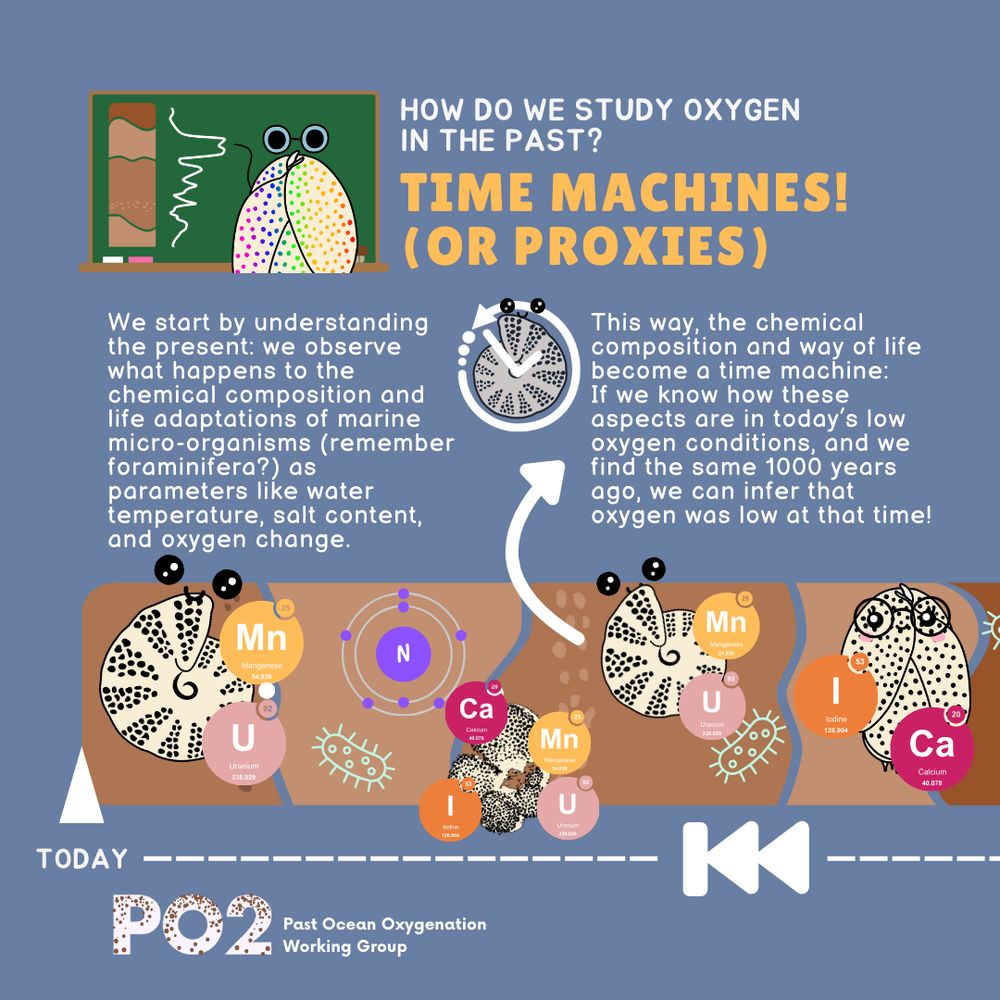

August 29, 2025 at 11:12 AM
Hi again, Oxyguys!!🤓🌍🌊“Proxies: Windows into the Past” Did you know scientists can uncover past climates using proxies? These are measurable clues preserved in marine sediments—like tiny “time machines” recording signals of temperature, oxygen, or salt. @pages-ipo.bsky.social @pages-ecn.bsky.social
📑🔬¿Sabes qué es el oxígeno oscuro? Un estudio publicado en Nature Geoscience muestra un descubrimiento sorprendente: más oxígeno del esperado en el océano profundo. Aquí, el oxígeno proviene de la ventilación de aguas menos profundas y es consumido por organismos para respirar y oxidar materia.

August 14, 2025 at 2:53 PM
📑🔬¿Sabes qué es el oxígeno oscuro? Un estudio publicado en Nature Geoscience muestra un descubrimiento sorprendente: más oxígeno del esperado en el océano profundo. Aquí, el oxígeno proviene de la ventilación de aguas menos profundas y es consumido por organismos para respirar y oxidar materia.
📑🔬You asked about dark oxygen, here it is! In Nature Geosciences, a study shows a striking discovery: more oxygen than expected in the abyssal ocean. Here, oxygen is mostly supplied by ventilation from shallower waters, & it is consumed by organisms through respiration and oxidation of matter.

August 12, 2025 at 3:41 PM
📑🔬You asked about dark oxygen, here it is! In Nature Geosciences, a study shows a striking discovery: more oxygen than expected in the abyssal ocean. Here, oxygen is mostly supplied by ventilation from shallower waters, & it is consumed by organisms through respiration and oxidation of matter.
📣 Abstract submission is open for the Ocean Science Meeting!🌊We invite the #ocean #oxygen community to our PO2 session on #past, #present, & #future #deoxygenation. Join us at the conference. 👉 Scan the QR for details on our session and travel #funding options.@pages-ipo.bsky.social @agu.org #OSM26

August 8, 2025 at 2:42 PM
Reposted by PO2 - Past Ocean Oxygen Working Group
🧐 You can also read more about it here www.marum.de/en/Oxygen-AM... @dharmarx.bsky.social @oceano2.bsky.social @kielunimarine.bsky.social @pastoxygen.bsky.social @geolatinas.bsky.social
Tracking Atlantic Meridional Overturning Circulation using benthic foraminifera
www.marum.de
July 20, 2025 at 5:10 AM
🧐 You can also read more about it here www.marum.de/en/Oxygen-AM... @dharmarx.bsky.social @oceano2.bsky.social @kielunimarine.bsky.social @pastoxygen.bsky.social @geolatinas.bsky.social
📣Exciting Announcement: PO2 Newsletter – 5th Edition is out! 🔬 🌊 🌏
We’re happy to share the new edition of the Past Ocean Oxygenation (PO2) Newsletter! This issue features updates on major events and recent research related to ocean oxygenation in the past. @pages-ipo.bsky.social
We’re happy to share the new edition of the Past Ocean Oxygenation (PO2) Newsletter! This issue features updates on major events and recent research related to ocean oxygenation in the past. @pages-ipo.bsky.social
August 5, 2025 at 9:36 AM
📣Exciting Announcement: PO2 Newsletter – 5th Edition is out! 🔬 🌊 🌏
We’re happy to share the new edition of the Past Ocean Oxygenation (PO2) Newsletter! This issue features updates on major events and recent research related to ocean oxygenation in the past. @pages-ipo.bsky.social
We’re happy to share the new edition of the Past Ocean Oxygenation (PO2) Newsletter! This issue features updates on major events and recent research related to ocean oxygenation in the past. @pages-ipo.bsky.social
Reposted by PO2 - Past Ocean Oxygen Working Group
🎉Are you a mineralogist who also loves museums? 🎉
Come join the Natural History Museum Denmark! We are looking for an assistant professor and curator of mineralogy. Advert can be found below, but apply soon! Deadline is 11th August😱
candidate.hr-manager.net/ApplicationI...
Come join the Natural History Museum Denmark! We are looking for an assistant professor and curator of mineralogy. Advert can be found below, but apply soon! Deadline is 11th August😱
candidate.hr-manager.net/ApplicationI...
211-0241/25-2N Tenure-track Assistant Professor and Curator in Mineralogy at Natural History Museum Denmark
candidate.hr-manager.net
July 29, 2025 at 3:57 PM
🎉Are you a mineralogist who also loves museums? 🎉
Come join the Natural History Museum Denmark! We are looking for an assistant professor and curator of mineralogy. Advert can be found below, but apply soon! Deadline is 11th August😱
candidate.hr-manager.net/ApplicationI...
Come join the Natural History Museum Denmark! We are looking for an assistant professor and curator of mineralogy. Advert can be found below, but apply soon! Deadline is 11th August😱
candidate.hr-manager.net/ApplicationI...
Reposted by PO2 - Past Ocean Oxygen Working Group
🤔 Did you know that with a weaker #AMOC tropical shallower waters got + oxygen in the last deglacial? 😱 Using benthic #forams, we explore how #AMOC influences Atlantic shallow circulation 🌊🐚🔬👩🚀 www.nature.com/articles/s41... @marumunibremen.bsky.social @natcomms.nature.com
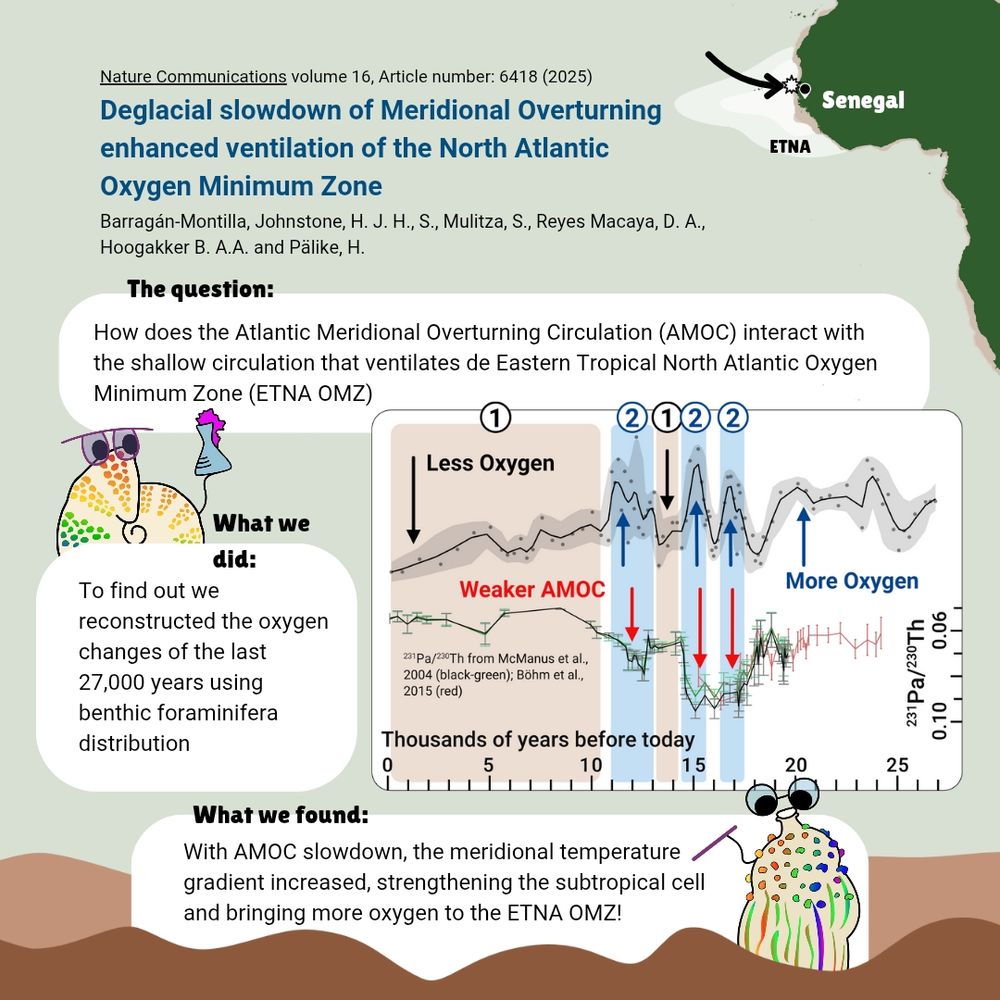
July 30, 2025 at 1:31 PM
🤔 Did you know that with a weaker #AMOC tropical shallower waters got + oxygen in the last deglacial? 😱 Using benthic #forams, we explore how #AMOC influences Atlantic shallow circulation 🌊🐚🔬👩🚀 www.nature.com/articles/s41... @marumunibremen.bsky.social @natcomms.nature.com
Reposted by PO2 - Past Ocean Oxygen Working Group
🚨Our new @natcomms.nature.com paper is out! 🤔Did you know that with a weaker #AMOC, tropical shallower waters got + oxygen in the last deglacial? Using benthic #forams, we explore how deep #AMOC influences Atlantic shallow circulation 🌊🐚🔬👩🚀 www.nature.com/articles/s41... @marumunibremen.bsky.social

July 20, 2025 at 5:10 AM
🚨Our new @natcomms.nature.com paper is out! 🤔Did you know that with a weaker #AMOC, tropical shallower waters got + oxygen in the last deglacial? Using benthic #forams, we explore how deep #AMOC influences Atlantic shallow circulation 🌊🐚🔬👩🚀 www.nature.com/articles/s41... @marumunibremen.bsky.social
Reposted by PO2 - Past Ocean Oxygen Working Group
📢The Past Ocean Oxygenation @pages-ipo.bsky.social Working Group is here! 🚤 We provide insights into the natural variability of seawater oxygen in key periods of the geological record & communicate the science behind oxygen reconstructions 🐳 PO2 is here! pastglobalchanges.org/science/wg/p...


June 11, 2025 at 6:16 PM
📢The Past Ocean Oxygenation @pages-ipo.bsky.social Working Group is here! 🚤 We provide insights into the natural variability of seawater oxygen in key periods of the geological record & communicate the science behind oxygen reconstructions 🐳 PO2 is here! pastglobalchanges.org/science/wg/p...
Reposted by PO2 - Past Ocean Oxygen Working Group
Hi again!📝¿Oxígeno Disuelto en el Océano (OD)? 🌊🤓¿Sabes qué es? Hablemos de algunos conceptos básicos que usaremos en nuestras futuras publicaciones para hablar de la oxigenación oceánica en el pasado. Los científicos usan equipos especializados para medir el OD en el océano. @pages-ipo.bsky.social
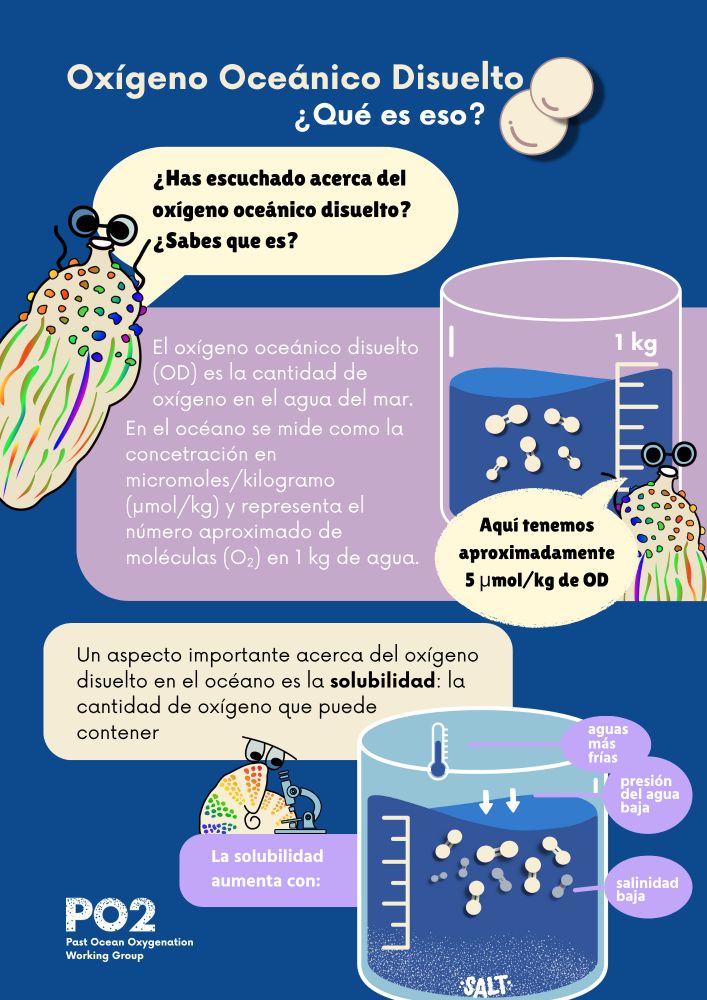
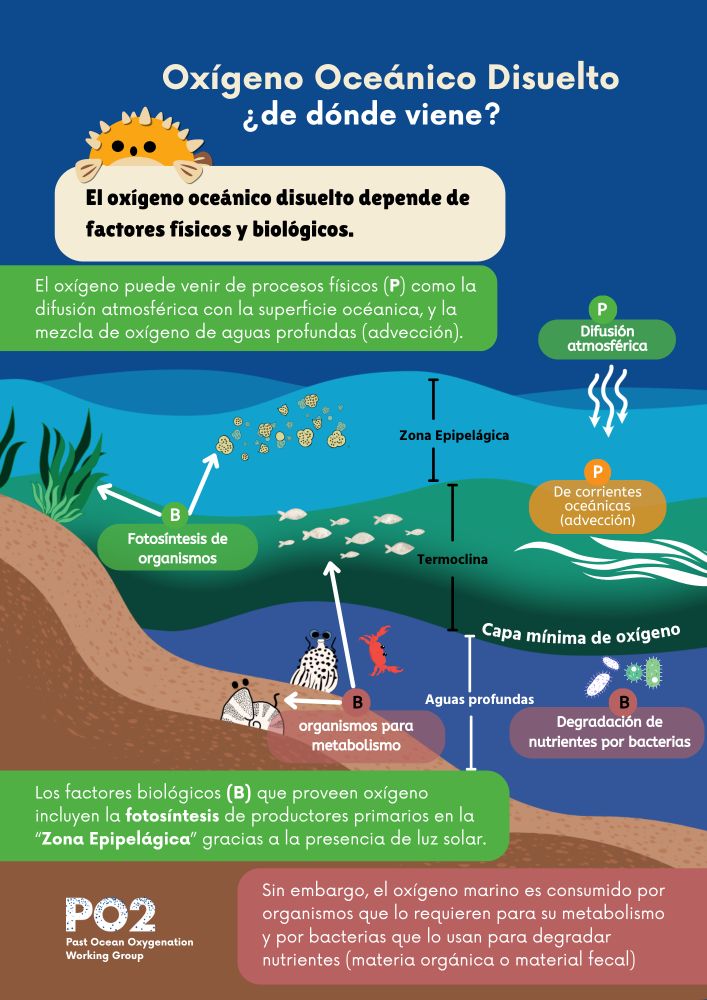
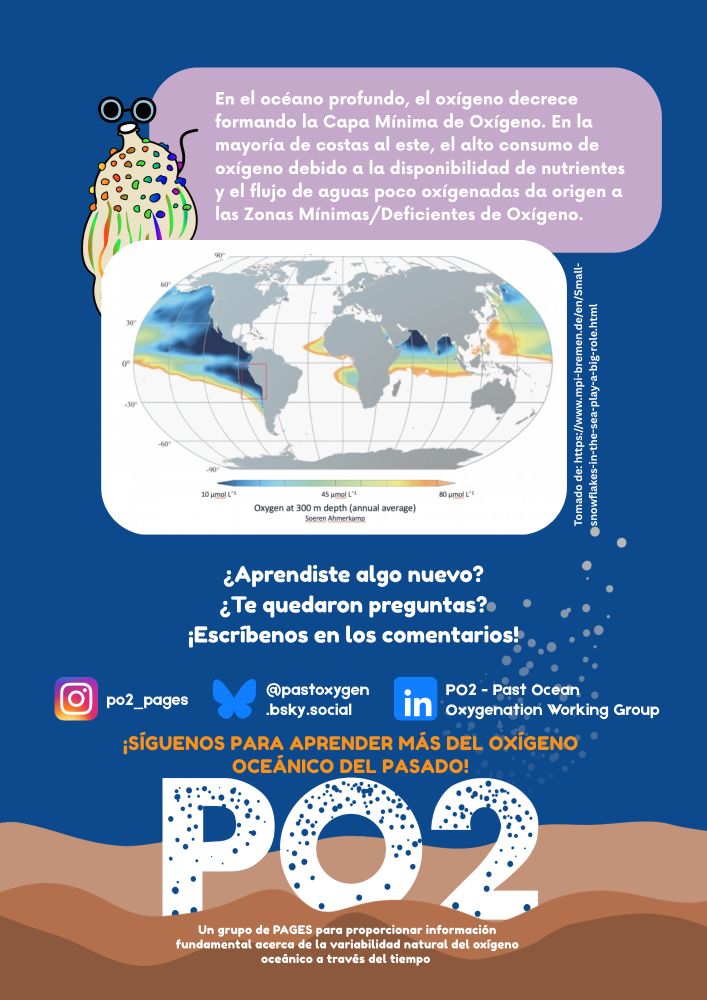
June 27, 2025 at 12:39 PM
Hi again!📝¿Oxígeno Disuelto en el Océano (OD)? 🌊🤓¿Sabes qué es? Hablemos de algunos conceptos básicos que usaremos en nuestras futuras publicaciones para hablar de la oxigenación oceánica en el pasado. Los científicos usan equipos especializados para medir el OD en el océano. @pages-ipo.bsky.social
Reposted by PO2 - Past Ocean Oxygen Working Group
New study: More oxygen in the oxygen-minimum zone associated with weaker Atlantic overturning circulation - now in Nature Communications.
@marumunibremen.bsky.social
@kielunimarine.bsky.social
@sofigerina.bsky.social
#ClimateChange #AMOC #OceanScience #Foraminifera #PaleoData
@marumunibremen.bsky.social
@kielunimarine.bsky.social
@sofigerina.bsky.social
#ClimateChange #AMOC #OceanScience #Foraminifera #PaleoData
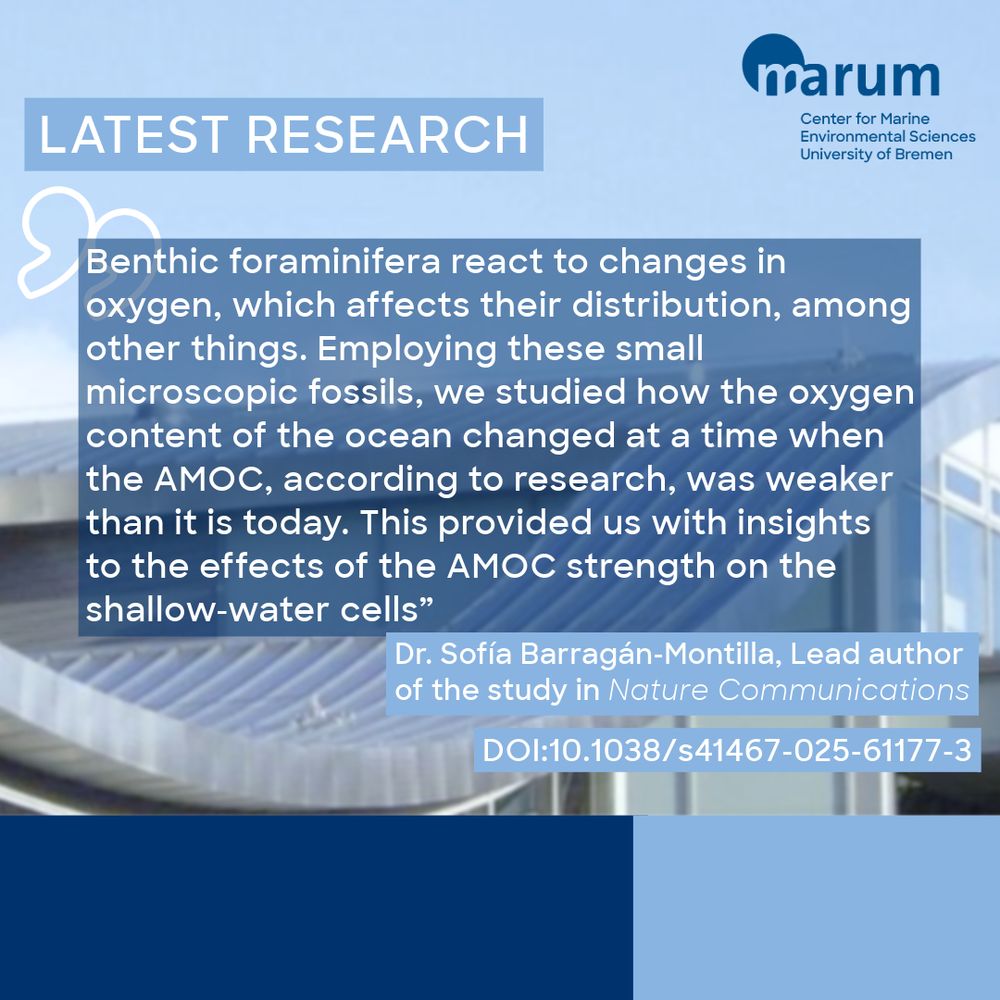
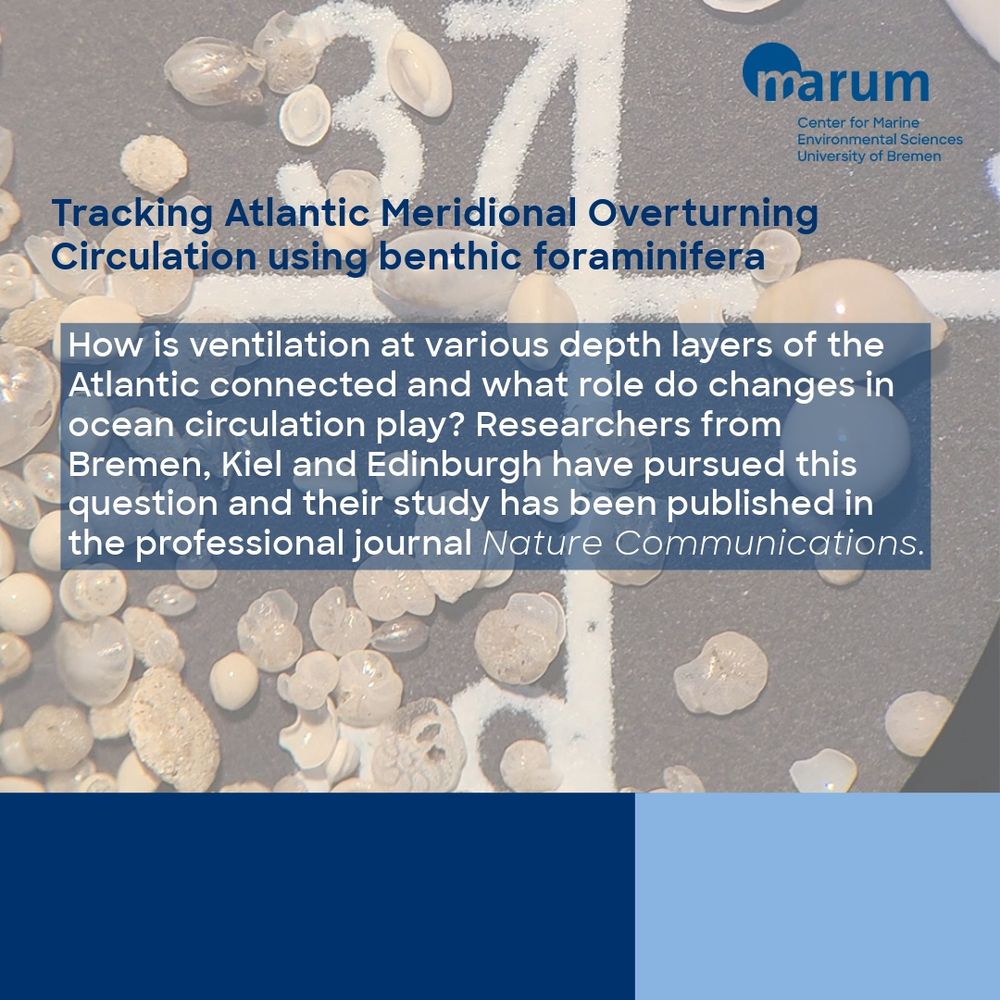
July 17, 2025 at 9:48 AM
New study: More oxygen in the oxygen-minimum zone associated with weaker Atlantic overturning circulation - now in Nature Communications.
@marumunibremen.bsky.social
@kielunimarine.bsky.social
@sofigerina.bsky.social
#ClimateChange #AMOC #OceanScience #Foraminifera #PaleoData
@marumunibremen.bsky.social
@kielunimarine.bsky.social
@sofigerina.bsky.social
#ClimateChange #AMOC #OceanScience #Foraminifera #PaleoData
Reposted by PO2 - Past Ocean Oxygen Working Group
In this paper, we present new global calibrations for the I/Ca proxy for ocean oxygenation, with the first Pacific transect. By comparing data from planktonic foram species that live at different water depths, we gain a better understanding of the proxy and its relationship to O2
#paleoceanography
#paleoceanography
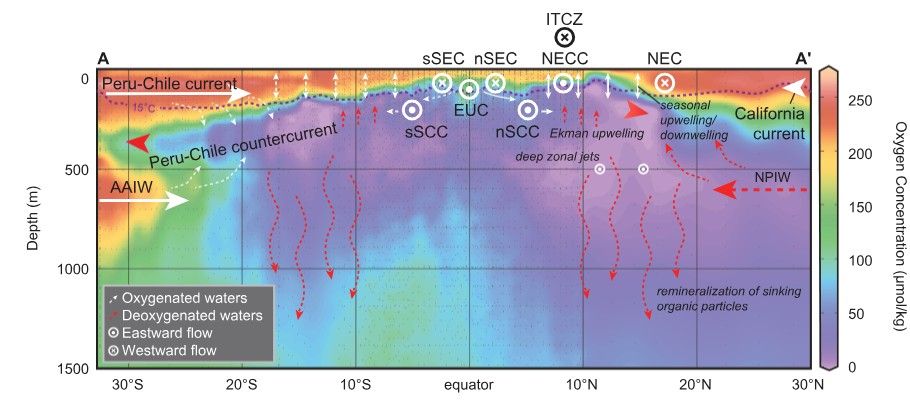
July 16, 2025 at 2:48 PM
In this paper, we present new global calibrations for the I/Ca proxy for ocean oxygenation, with the first Pacific transect. By comparing data from planktonic foram species that live at different water depths, we gain a better understanding of the proxy and its relationship to O2
#paleoceanography
#paleoceanography
Hi 🤓🌊🌍ocean oxygen community. 💡📑Abstract submission is now open for the American Geoscience Meeting - AGU @agu.org. We want to invite you to join our PO2 session about past, present and future deoxygenation. In the following QR you will find information about our session and travel funding options.
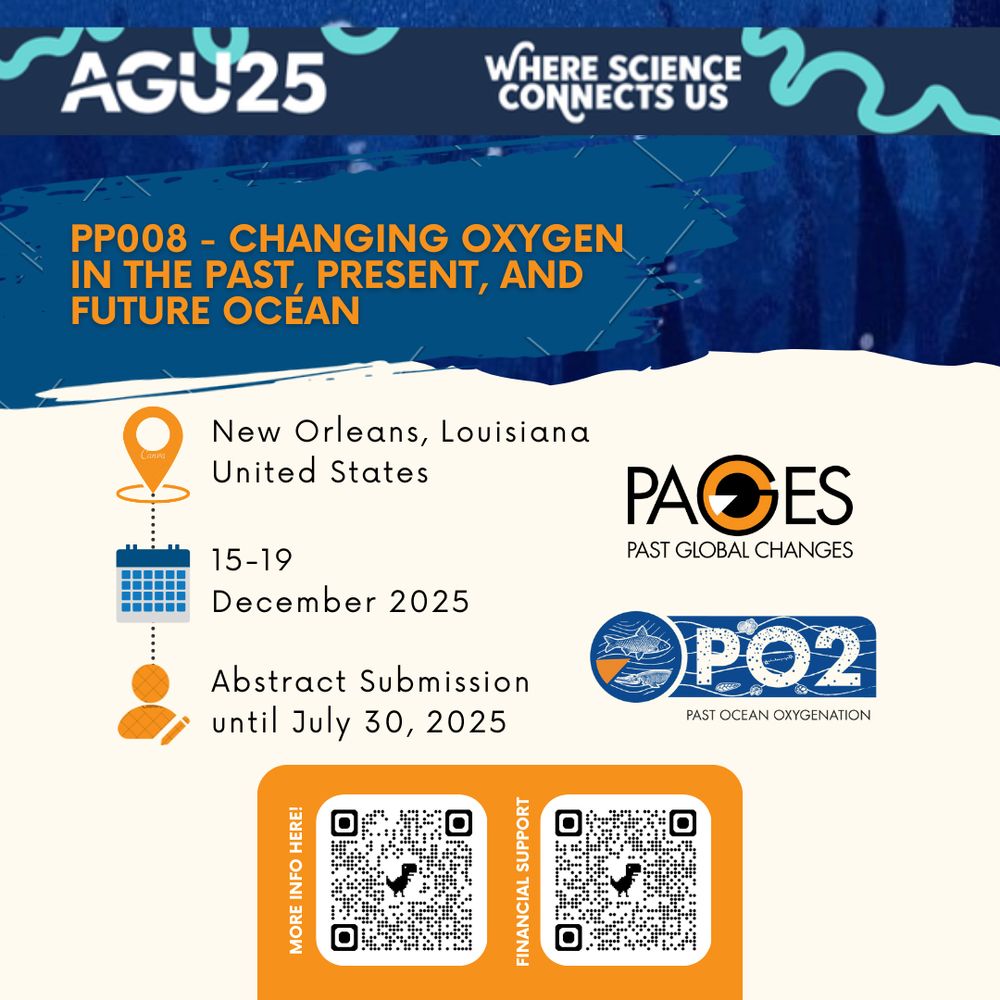
July 15, 2025 at 2:13 PM
Hi 🤓🌊🌍ocean oxygen community. 💡📑Abstract submission is now open for the American Geoscience Meeting - AGU @agu.org. We want to invite you to join our PO2 session about past, present and future deoxygenation. In the following QR you will find information about our session and travel funding options.
Hola otra vez !!!🤓🌊🌎 (pero en Español)💡 Hoy vamos a hablar de foramíniferos con la ayuda de SciCoForams una iniciativa de comunicación científica de @sofigerina.bsky.social Los foraminíferos o abreviado “forams” 🐚son organismos unicelulares que habitan los océanos desde hace 541 millones de años.
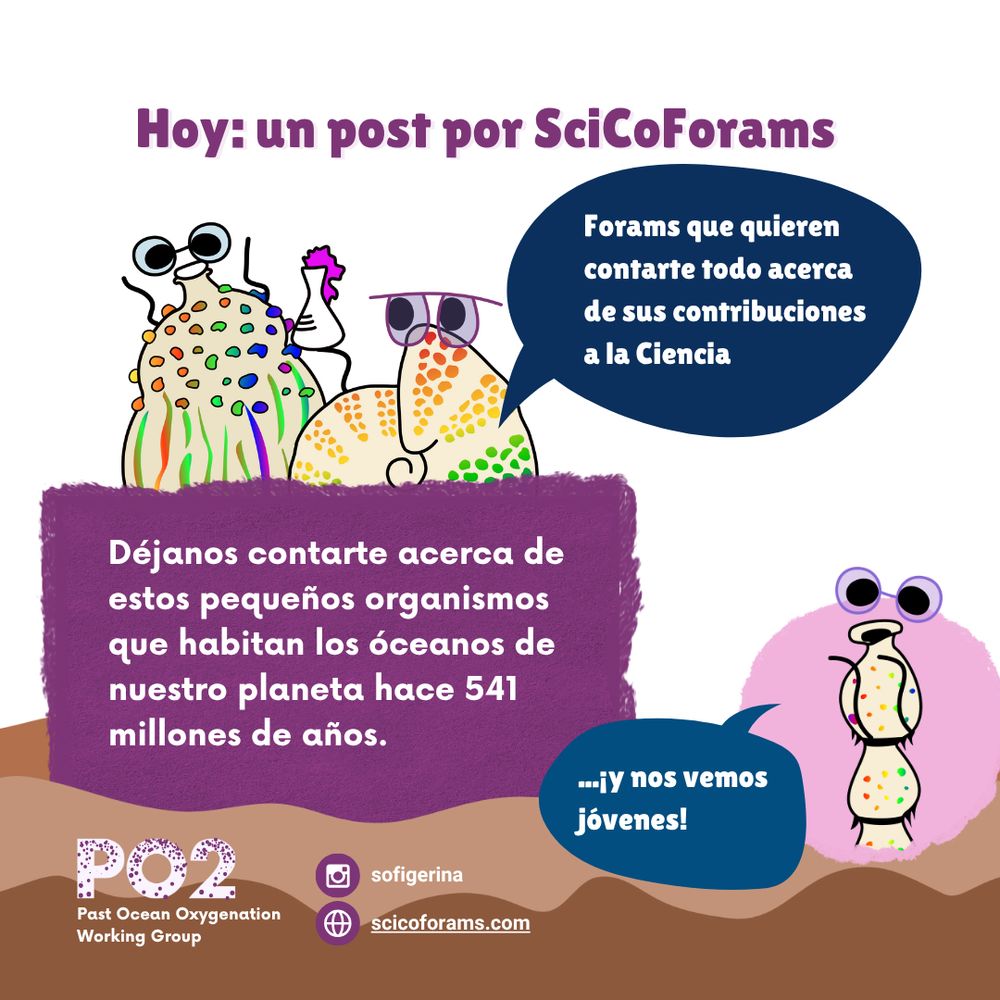
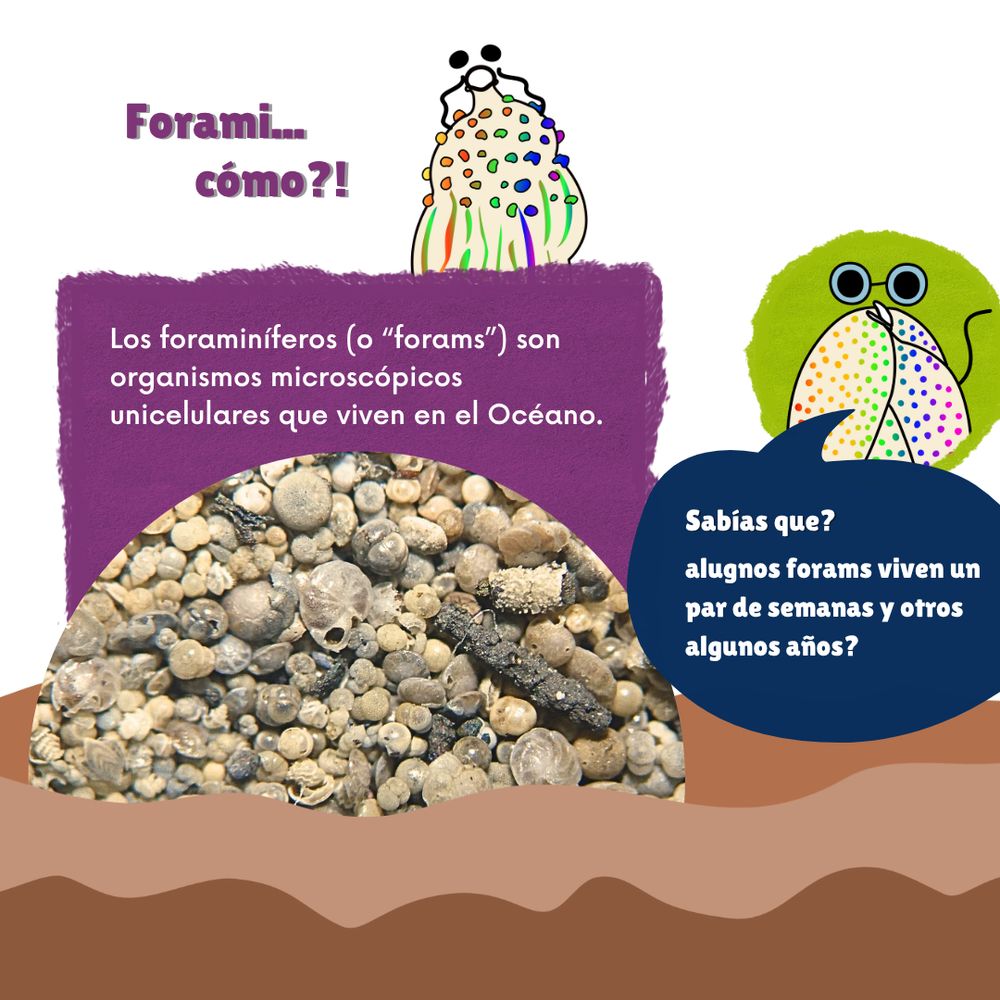
July 4, 2025 at 9:57 AM
Hola otra vez !!!🤓🌊🌎 (pero en Español)💡 Hoy vamos a hablar de foramíniferos con la ayuda de SciCoForams una iniciativa de comunicación científica de @sofigerina.bsky.social Los foraminíferos o abreviado “forams” 🐚son organismos unicelulares que habitan los océanos desde hace 541 millones de años.
Hi again!🤓🌊🌎 Today, we want to talk to you about foraminifera with the help of SciCoForams an independent #scicomm initiative by Sofía Barragán-Montilla @sofigerina.
Foraminifera, or “Forams”🐚 for short, are single-celled organisms that have lived in the ocean for over 541 million years.
Foraminifera, or “Forams”🐚 for short, are single-celled organisms that have lived in the ocean for over 541 million years.
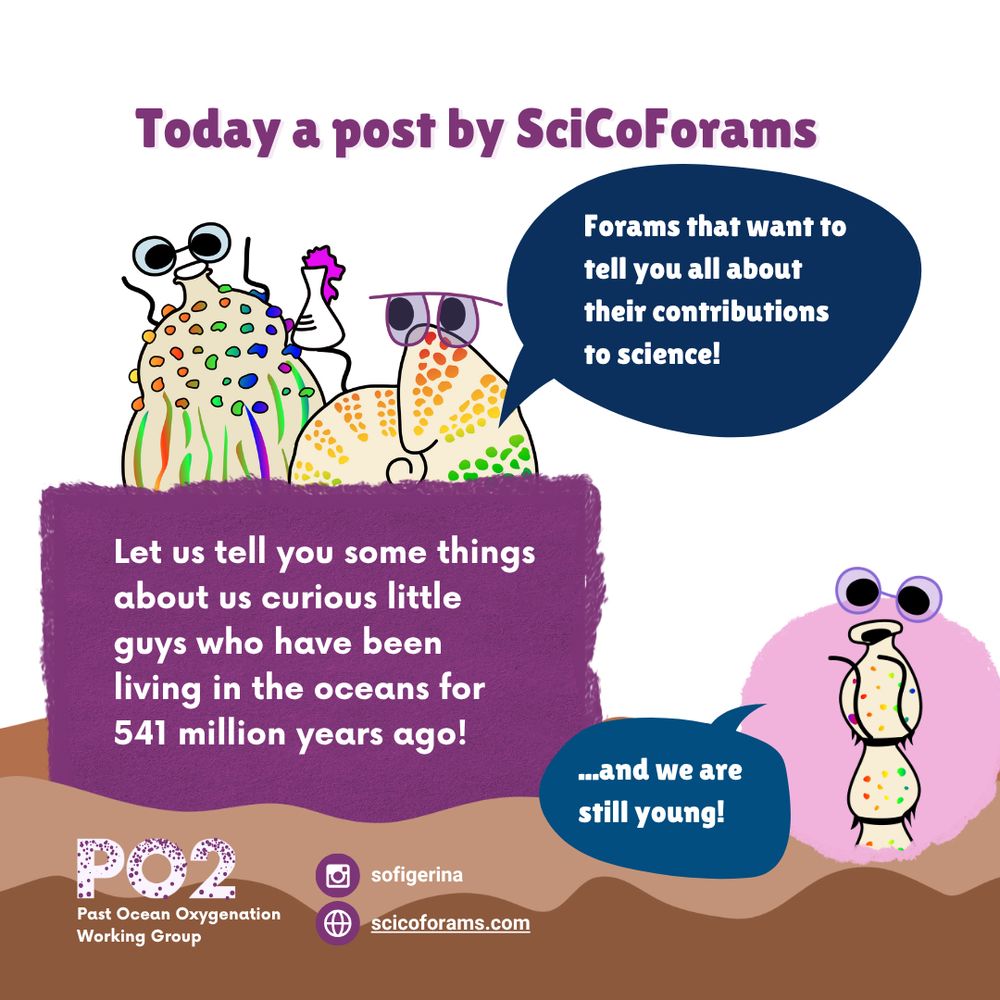
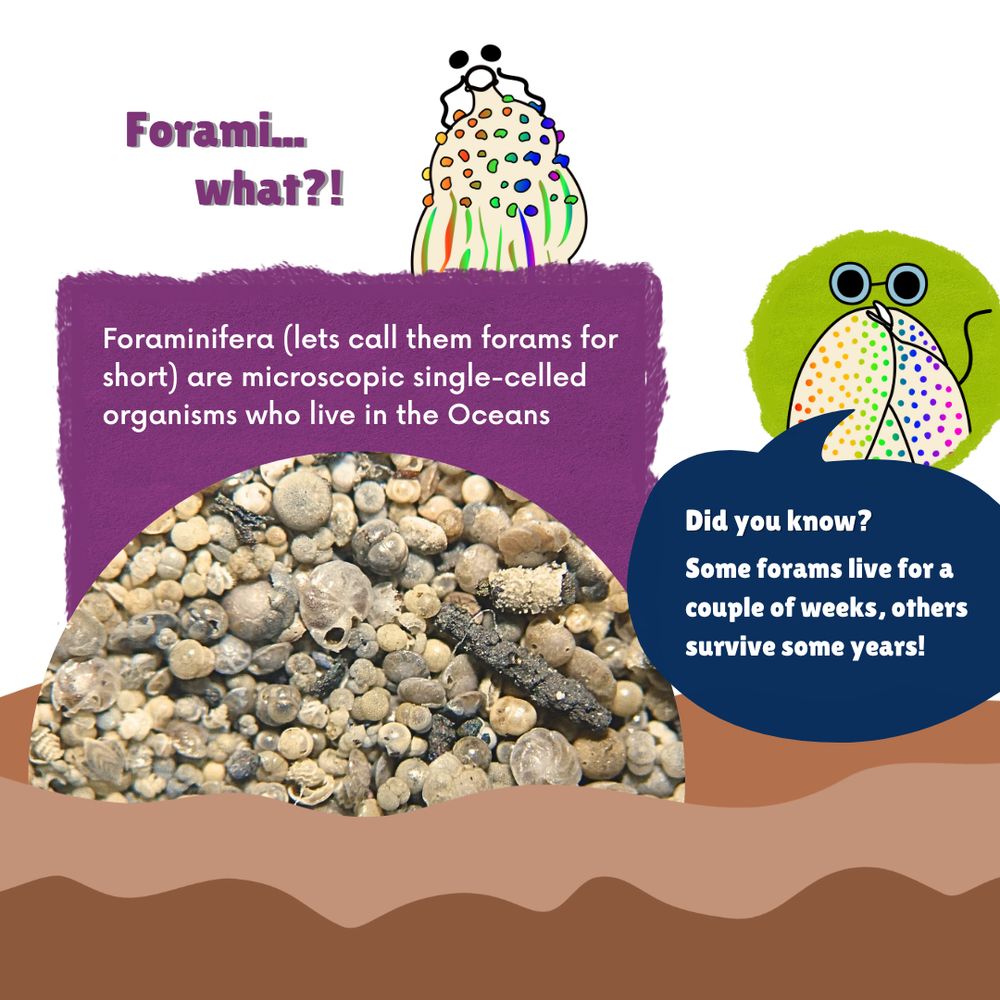
July 2, 2025 at 7:51 AM
Hi again!🤓🌊🌎 Today, we want to talk to you about foraminifera with the help of SciCoForams an independent #scicomm initiative by Sofía Barragán-Montilla @sofigerina.
Foraminifera, or “Forams”🐚 for short, are single-celled organisms that have lived in the ocean for over 541 million years.
Foraminifera, or “Forams”🐚 for short, are single-celled organisms that have lived in the ocean for over 541 million years.


